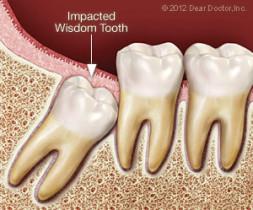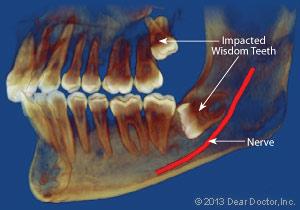What Is impacted tooth It?

An impacted tooth is a tooth that gets blocked as it is pushing through the gum into your mouth (erupting). Wisdom teeth often are impacted.
Wisdom teeth usually begin to come in between the ages of 17 and 21. Dentists call these teeth third molars. They may become impacted because there’s not enough room in your mouth for them. A wisdom tooth also might be trying to come in sideways. Or, it might be tilted in your jaw.
An impacted tooth can be painless. However, when an impacted wisdom tooth tries to come in, the flap of gum on top of it can become infected and swollen. This can hurt. You might even feel pain in nearby teeth, or in the ear on that side of your face.
An impacted tooth can lead to an infection called pericoronitis. If untreated, this infection can spread to the throat or into the neck. Severe infections require a hospital stay and surgery.
Impacted teeth also can get cavities. An impacted tooth can push on the neighboring molar. This can lead to tooth movement, decay or gum disease. It also can change the way your teeth come together. Rarely, impacted teeth can cause cysts or other growths in the jaw.
Many people have all four of their wisdom teeth taken out at once. Sometimes this surgery is done before the teeth have started coming in. This prevents future problems. Often, it is better to have your wisdom teeth taken out before you turn 21. The surgery usually is less complicated. The tissue and bone also heal better.

Symptoms
Symptoms include:
- Swelling of the gum in the back of your mouth
- Difficulty opening your jaw
- Bad breath
- A bad taste in the mouth
- Pain when you open your mouth
- Pain when chewing or biting- Pain can occur for several days and then disappear. It can come back weeks or months later.
Diagnosis
Your dentist will examine the area. If necessary, he or she will take X-rays. X-rays can show where your wisdom teeth are and if they are impacted.
Prevention
There is no way to prevent an impacted tooth. You can prevent cavities by brushing and flossing.
After the surgery
- Swelling of the cheeks and jaw.
- May be hard to eat certain foods.
- Complications of surgery are rare, but do occur (dry socket)
When To Call a Professional
Call your dentist if you feel pain in your back teeth. If you visit your dentist regularly, he or she will keep track of your wisdom teeth and let you know if you need to have them taken out. Your dentist may take extra X-rays to check your wisdom teeth. Routine X-rays often don’t show these teeth.








